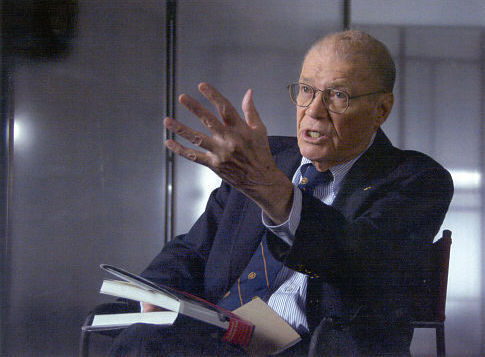|
Reviews of Recent Independent, Foreign, & Documentary Films in Theaters and DVD/Home Video
Directed by: Errol Morris. Produced by: Julie Bilson Ahlberg, Errol Morris & Michael Williams. Director of Photography: Robert Chappell & Peter Donahue. Edited by: Doug Abel, Chyld King & Karen Schmeer. Music by: Philip Glass. Released by: Sony Picture Classics. Country of Origin: USA. 95 min. Rated: PG-13. With: Robert McNamara. Special Features: 24 additional scenes. "Robert S. McNamara's 10 Lessons From His Life in Politics". TV spots. Trailers. French/Portuguese/Spanish/Japanese subtitles. (Some extras subtitled in Japanese.)
Former ambassador Llewellyn (Tommy) Thompson, having lived with Soviet Premier Nikita
Khrushchev, knew what would deflate the Cuban Missile Crisis, as well as save
face for the Soviet leader. Robert McNamara, the former secretary of defense
for the Kennedy and Johnson administrations, offers this fascinating example to illustrate
his first lesson, “Empathize with your enemy.” Throughout, he offers many
personal anecdotes from his wide-ranging career covering his service in World
War II, his tenure as president of Ford Motor Company and Cold War warrior.
Rather than offering a mea culpa in this one-sided conversation, McNamara
matter-of-factly defends his career, underscored by archival footage. There’s
enough material here for many films. Born in 1916, he even remembers the
celebrations marking the end of World War I. In the Second World War, he was
part of the plan to firebomb Japan. Grappling with the rules of war, he makes a
frank and startling admission. And never having served in government, he is reluctant
to do so when asked by John F. Kennedy. The president-elect persists - “Look
Bob, I don’t think there’s a school for the presidency.” Perhaps the most moving testimony regards his assisting Jacqueline
Kennedy following JFK’s assassination. Needless to say, his accounts are thought
provoking and timely, especially lesson nine, “In order to do good, you may have to
engage in evil.” However, the hypnotic and repetitive score by Philip Glass often
upstages the film. The content is potent on its own. KT
DVD Extras: McNamara proclaims his 10 lessons as his own, as opposed to the lessons Morris
extrapolated from their conversations. They are pretty similar, though, to the ones found in the
documentary. An especially chilling pearl of wisdom imparted by McNamara, almost as if in
response to current events, is his lesson number three, part of which reads: "If we cannot persuade other
nations with similar interests and similar values of the merits of our proposed use of that power,
we should not proceed unilaterally except in the unlikely requirement to defend directly the
continental U.S., Alaska, and Hawaii." (He has refused to directly comment on current events,
stating he is not in possession of all the facts and therefore does not wish to second-guess the
U.S. governmental leadership.) One element that is sorely lacking - some form of commentary
track, whether it be Morris elaborating on his technique or a response by McNamara to the
finished film. Rather, there are two dozen additional scenes, some of which provide more
context, and others which are, admittedly, redundant. Two scenes are as haunting and
vital as anything in The Fog of War: the lessons McNamara learned from WWII regarding the
importance of understanding the geopolitical sequence of events as a prerequisite of combat, and
when he mentions Kennedy's prophetic suggestion to his administration they read The Guns
of August to learn from the military mistakes made in the events recounted. Another highlight is the notorious Johnson campaign ad from 1964, meant to
scare the electorate into voting for the incumbent. A case could be
made that another scene, of McNamara detailing his overhaul of the Ford Company's accounting
practices, should have stayed in the film, since it demonstrates the trademark assembly-line
efficiency that was probably the reason Kennedy asked McNamara to take the defense secretary
position in the first place, and which would eventually be used toward considerably more lethal
ends. McNamara gets very emotional, however, talking about his deceased wife Marg's
humanitarian work, and (perhaps a bit self-servingly) his own accomplishments as head of the
World Bank. Finally, he makes a comparison between his situation and that of the Biblical story
of Job that is unintentionally comical, since one suspects that - at least in his analogy -
McNamara means to compare himself to God. Reymond Levy
|

